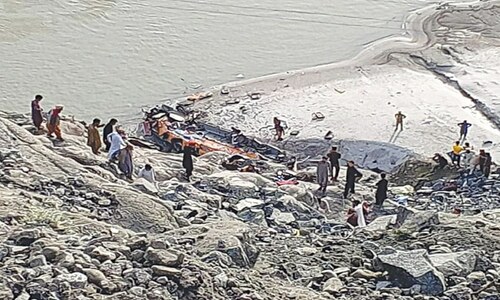NEW YORK, Dec 3: Human Rights Watch on Monday urged the United States and Britain to take immediate measures to ensure that three Taliban commanders who are alleged to have committed warcrimes be held by an outside independent authority until they can be prosecuted before an impartial tribunal.
The HRW said that Mullah Fazil and Maulvi Nurullah Nuri were known to be in Mazar-i-Sharif in the custody of Northern Alliance Commander Gen Abdul Rashid Dostum. Mullah Dadaullah was also known to be in Northern Alliance custody, but his precise whereabouts were not known, the report said.
The HRW report said that the US and Britain should establish procedures for the transfer and detention of Afghan and foreign combatants suspected of serious abuses. These fighters should be taken into custody by US or British forces and delivered to an independent authority, or be placed in safe and secure detention facilities in Afghanistan, with oversight by US or UK forces and independent observers. Fazil, Dadaullah, and Nuri represent a test case for how the international community was going to ensure that those who were implicated in the worst atrocities in Afghanistan were brought to justice, said Sidney Jones, HRW’s Asia Director.
“If these men and others like them are not prosecuted, the cycle of violent abuse in Afghanistan is not going to end,” he said.
Mullah Fazil of the Taliban movement had overall operational command and specific sectoral responsibilities during a Taliban offensive that led to the recapture of Khwagaghar town in Takhar province and surrounding areas in January 2001. Over 30 civilians were detained and summarily executed during this operation, while at least 45 others were detained and transferred to a jail in Kunduz, a Human Rights Watch report released here on Monday said.
Numerous witnesses have also testified that Mallah Fazil visited Yakaolang district, as commander-in-chief, during a January 2001 massacre of over 170 Shia Hazara civilians. The Yakaolang victims had been detained by Taliban forces and then executed by firing squad in public view.
Mullah Dadaullah commanded Taliban forces that carried out a scorched earth policy in Yakaolang district in the mainly Shia Hazarajat region, in June 2001. After briefly recapturing Yakaolang, Dadaullah’s forces burned down over 4,000 homes, shops, and public buildings in the district. His forces continued their scorched earth policy as they retreated east, destroying entire towns and villages in the western part of Bamiyan province. Most of the civilian population in western Bamiyan fled the Taliban advance, but those who remained behind, as well as some who had encamped in the hills, were summarily executed.
The Taliban’s official Bakhtar Information Agency confirmed Dadaullah’s responsibility for the military operations in the area. Dadaullah was also responsible for the massacre of thousands of Shias in Syedabad, in Mazar-i Sharif, in 1998, the HRW report said.
Maulvi Nurullah Nuri, the former governor of Balkh province — in which the city of Mazar-i-Sharif is located — was military commander of the northern zone under the Taliban. He could be implicated in the summary executions of ethnic Uzbek civilians in Balkh in May 2001, and in the massacre of civilian prisoners that took place at Robatak Pass, on the border of Samangan and Baghlan provinces, in May 2000.
Human Rights Watch called on the United Nations’ Special Representative for Afghanistan, Lakhdar Brahimi, to facilitate an arrangement, with the approval of Afghan representatives and the United Nations Security Council for an independent authority to take the custody of these suspects, and others with similar accusations against them, until a venue for a fair trial can be determined.
The rights group suggested that because there was currently no possibility for a fair and impartial trial in Afghanistan, persons accused of committing atrocities in Afghanistan would at least at the outset probably have to be tried in other courts — either domestic courts in third countries with universal jurisdiction (laws specifically allowing trials for human rights abuses, crimes against humanity and war crimes committed in other nations) or before an international tribunal specially created for Afghanistan.














































Dear visitor, the comments section is undergoing an overhaul and will return soon.